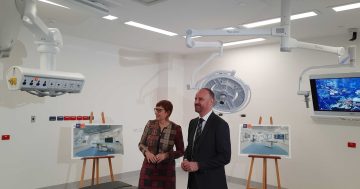The ACT Government’s 2011-12 Budget is disappointing for people with autism spectrum disorders (ASD), their families, carers and support organisation. The ACT Budget does not meet the needs of people with disabilities generally and ignores the ASD community.
Mr Buckley, Chair of Autism Asperger ACT’s Political Action Group, says “the community is pleased that the ACT Budget provides 10 after-school places for 4 years for teenagers … and that the Greens and the ACT Government responded to political, community and media pressure. The ACT Government stepped in where the Commonwealth’s fragmented and inequitable after-school program for teenagers with severe disability fails vulnerable people in Canberra.”
But after school care for teenagers with severe disability is just one issue. The Productivity Commission said in its recent 800+ page Disability Care and Support Draft Report
The current disability support system is underfunded, unfair, fragmented, and inefficient, and gives people with a disability little choice and no certainty of access to appropriate supports.
“The Productivity Commission’s report says more efficient service deliver and twice as much money in the disability sector might support half the people with severe or profound disability”, Mr Buckley says.
“In her Budget Speech, the Treasurer says Canberra ‘cares for its people’ but its Government does not recognise the needs of people with a disability nor consult the community on how to care better for ‘those in our community who need additional assistance’”.
“Disability services and support in the ACT are below the national average. People with a disability need more care than this budget provides. The ACT Government has yet to recognise the level of need, especially for people with ASD”, Mr Buckley says. “The ASD community in the ACT is united in a single organisation but the ACT Government rarely discusses ASD services with Autism Asperger ACT. It’s not just about money.”
The ACT Government does not recognise the severity of ASD. Last year, the Government told the Select Committee on Budget estimates
… the primary diagnosis may actually be an intellectual disability diagnosis rather than an autism diagnosis.
The Diagnostic and Statistical Manual of Mental Disorders 4th Edition (called the DSM-IV) has autism on Axis I and Mental Retardation (the formal and politically incorrect name for Intellectual Disability) on Axis II: the manual is clear that autism is “the primary diagnosis”. “Officials who are responsible for disability services should know this” Mr Buckley said.
The Australian Institute of Health and Welfare reported
Autism and intellectual impairment were associated with high proportions of severe or profound core activity limitation—87% and 75% of children with these respective conditions also had a severe or profound core activity limitation.
According to Mr Buckley “generic disability support and advocacy groups do not recognise that people with ASD need services for their severe disability and some of those services need to address ASD specifically”.
Governments do not ensure services for people with ASD keep up with the growing numbers of people diagnosed with ASD and their support needs. In the past, autism was a rare diagnosis. But autism diagnoses have grown 15% per years (doubling every 5 years) for the last 20 to 30 years. Now, 1% of children are diagnosed with ASD.
Members of Autism Asperger ACT are concerned and disappointed that the ACT Government officials, and disability advocates funded by Government, complain whenever increasing services for people with ASD is suggested. The officials and funded advocates do not complain about improving services for other types of disability.
Both the Commonwealth and ACT governments fund support and advocacy organisations for other disabilities, but not for autism/ASD. Other states fund the basic operation of their autism associations to advise about the needs of people with ASD, but not the ACT.
People with ASD find that the ACT Government Budgets use phrases like “including autism” but few (if any) people with autism/ASD end up getting the service. If the Government really wants to help people with ASD, it needs to say how many people with ASD will be included and monitor services to ensure the service meets the target.
“Some schools create behavioural challenges in students with ASD. And some parents exhaust their annual leave through the resultant school exclusions (schools send students with ASD home as the students who may have behavioural “issues” have no right to education under Australian law). In the ACT, students with ASD cannot access skilled allied health professionals and get the individual behavioural therapy programs that they need for their education.
Autism Asperger ACT hopes students with ASD will benefit from $632,000 in the Budget for
A pilot … Program [where] Therapy Assistants would work in schools to carry out therapy programs developed by allied health professionals for individual children.
“Any such pilot program, in order to help students with ASD, will need service providers with expertise in ASD-specific behavioural services” Mr Buckley said. “DHCS would not be a candidate for helping students with ASD with their clinical needs since it said recently that it does ‘… not actually use the ABA [applied behaviour analysis] intervention method’”.
“Autism Asperger ACT wants to work with the ACT Government. We ask the ACT Government to recognise that people with ASD have real and distinct needs and that the ASD community has practical and evidence-based suggestions” Mr Buckley said. “We want to work with the ACT Government to improve outcomes for people with ASD.”





















